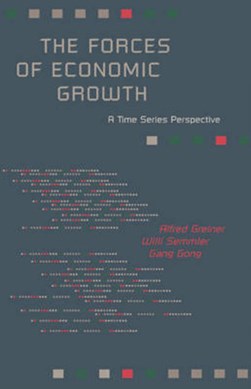-
BROWSE 1000s OF BOOKS IN STOCK
-
FREE DELIVERY ON ORDERS OVER €10
-
PRE-ORDER OBSESSED BY JOHNNY SEXTON
The forces of economic growth
PAPERBACK
In economics, the emergence of New Growth Theory in recent decades has directed attention to an old and important problem: what are the forces of economic growth and how can public policy enhance them? This book examines major forces of growth--including spillover effects and externalities, education and formation of human capital, knowledge creation through deliberate research efforts, and public infrastructure investment. Unique in emphasizing the importance of different forces for particular stages of development, it offers wide-ranging policy implications in the process. The authors critically examine recently developed endogenous growth models, study the dynamic implications of modified models, and test the models empirically with modern time series methods that avoid the perils of heterogeneity in cross-country studies. Their empirical analyses, undertaken with newly constructed time series data for the United States and some core countries of the Euro zone, show that models containing scale effects, such as the R&D model and the human capital model, are compatible with time series evidence only after considerable modifications and nonlinearities are introduced. They also explore the relationship between growth and inequality, with particular focus on technological change and income disparity. The Forces of Economic Growth represents a comprehensive and up-to-date empirical time series perspective on the New Growth Theory.
€31.90

95 Reward Points
In stock online
Extended Range: Delivery in 2-3 working days
Extended Range: Delivery in 2-3 working days
Free Delivery on this item
Any purchases for more than €10 are eligible for free delivery anywhere in the UK or Ireland!
In economics, the emergence of New Growth Theory in recent decades has directed attention to an old and important problem: what are the forces of economic growth and how can public policy enhance them? This book examines major forces of growth--including spillover effects and externalities, education and formation of human capital, knowledge creation through deliberate research efforts, and public infrastructure investment. Unique in emphasizing the importance of different forces for particular stages of development, it offers wide-ranging policy implications in the process. The authors critically examine recently developed endogenous growth models, study the dynamic implications of modified models, and test the models empirically with modern time series methods that avoid the perils of heterogeneity in cross-country studies. Their empirical analyses, undertaken with newly constructed time series data for the United States and some core countries of the Euro zone, show that models containing scale effects, such as the R&D model and the human capital model, are compatible with time series evidence only after considerable modifications and nonlinearities are introduced. They also explore the relationship between growth and inequality, with particular focus on technological change and income disparity. The Forces of Economic Growth represents a comprehensive and up-to-date empirical time series perspective on the New Growth Theory.

95 Reward Points
Any purchases for more than €10 are eligible for free delivery anywhere in the UK or Ireland!
€31.90

95 Reward Points
Any purchases for more than €10 are eligible for free delivery anywhere in the UK or Ireland!
Product Description
In economics, the emergence of New Growth Theory in recent decades has directed attention to an old and important problem: what are the forces of economic growth and how can public policy enhance them? This book examines major forces of growth--including spillover effects and externalities, education and formation of human capital, knowledge creation through deliberate research efforts, and public infrastructure investment. Unique in emphasizing the importance of different forces for particular stages of development, it offers wide-ranging policy implications in the process. The authors critically examine recently developed endogenous growth models, study the dynamic implications of modified models, and test the models empirically with modern time series methods that avoid the perils of heterogeneity in cross-country studies. Their empirical analyses, undertaken with newly constructed time series data for the United States and some core countries of the Euro zone, show that models containing scale effects, such as the R&D model and the human capital model, are compatible with time series evidence only after considerable modifications and nonlinearities are introduced. They also explore the relationship between growth and inequality, with particular focus on technological change and income disparity. The Forces of Economic Growth represents a comprehensive and up-to-date empirical time series perspective on the New Growth Theory.
Product Details
ISBN9780691170961
FormatPAPERBACK
PublisherPRINCETON UNIVERSITY PRESS (17 June. 2016)
No. of Pages208
Weight332
Language English
Dimensions 234.95 x 152.4 x 16

